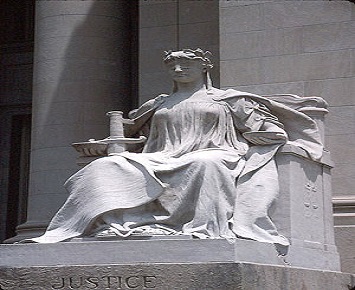Live in USA
 |
Law is a term which does not have a universally accepted definition,2 but one
definition is that law is a system of rules and guidelines which are enforced
through social institutions to govern behaviour.3 Laws can be made by
legislatures through legislation (resulting in statutes), the executive through
decrees and regulations, or judges through binding precedents (normally in
common law jurisdictions). Private individuals can create legally binding
contracts, including (in some jurisdictions) arbitration agreements that exclude
the normal court process. The formation of laws themselves may be influenced by
a constitution (written or unwritten) and the rights encoded therein. The law
shapes politics, economics, and society in various ways and serves as a social
mediator of relations between people.
A general distinction can be made
between civil law jurisdictions (including canon and socialist law), in which
the legislature or other central body codifies and consolidates their laws, and
common law systems, where judge-made binding precedents are accepted.
Historically, religious laws played a significant role even in settling of
secular matters, which is still the case in some countries, particularly
Islamic, and some religious communities, particularly Jewish Halakha. Sharia law
is the world's most widely used religious law.4
The adjudication of the law
is generally divided into two main areas. Criminal law deals with conduct that
is considered harmful to social order and in which the guilty party may be
imprisoned or fined. Civil law (not to be confused with civil law jurisdictions
above) deals with the resolution of lawsuits (disputes) between individuals or
organisations. These resolutions seek to provide a legal remedy (often monetary
damages) to the winning litigant.
Under civil law, the following specialties,
among others, exist: Contract law regulates everything from buying a bus ticket
to trading on derivatives markets. Property law regulates the transfer and title
of personal property and real property. Trust law applies to assets held for
investment and financial security. Tort law allows claims for compensation if a
person's property is harmed. Constitutional law provides a framework for the
creation of law, the protection of human rights and the election of political
representatives. Administrative law is used to review the decisions of
government agencies. International law governs affairs between sovereign states
in activities ranging from trade to military action.
To implement and enforce
the law and provide services to the public by public servants, a government's
bureaucracy, the military and police are vital. While all these organs of the
state are creatures created and bound by law, an independent legal profession
and a vibrant civil society inform and support their progresscitation needed.
Law provides a rich source of scholarly inquiry into legal history, philosophy,
economic analysis and sociology. Law also raises important and complex issues
concerning equality, fairness, and justice. There is an old saying that 'all are
equal before the law.'. The author Anatole France said in 1894, "In its majestic
equality, the law forbids rich and poor alike to sleep under bridges, beg in the
streets, and steal loaves of bread."5 Writing in 350 BC, the Greek philosopher
Aristotle declared, "The rule of law is better than the rule of any
individual."6 Mikhail Bakunin said: "All law has for its object to confirm and
exalt into a system the exploitation of the workers by a ruling class".7 Cicero
said "more law, less justice".8 Marxist doctrine asserts that law will not be
required once the state has withered away.
Download